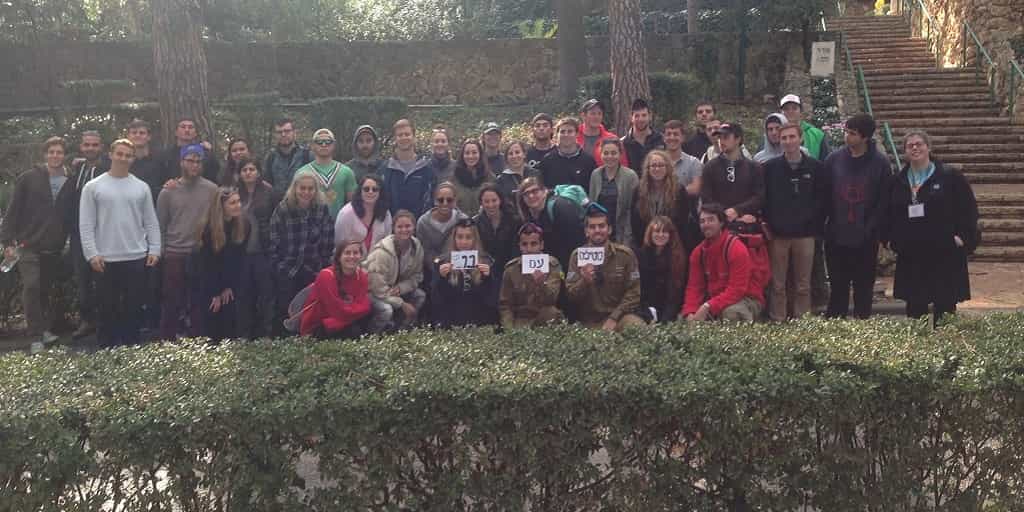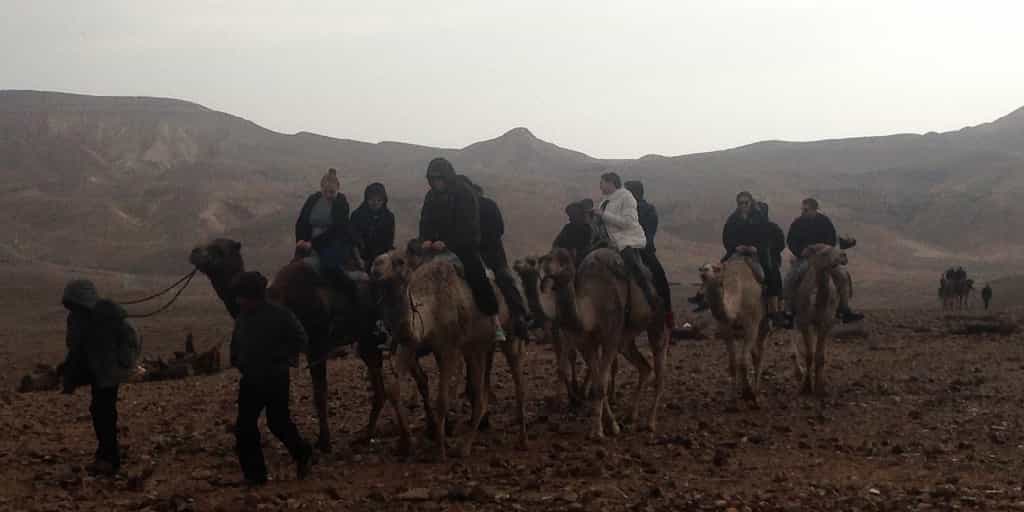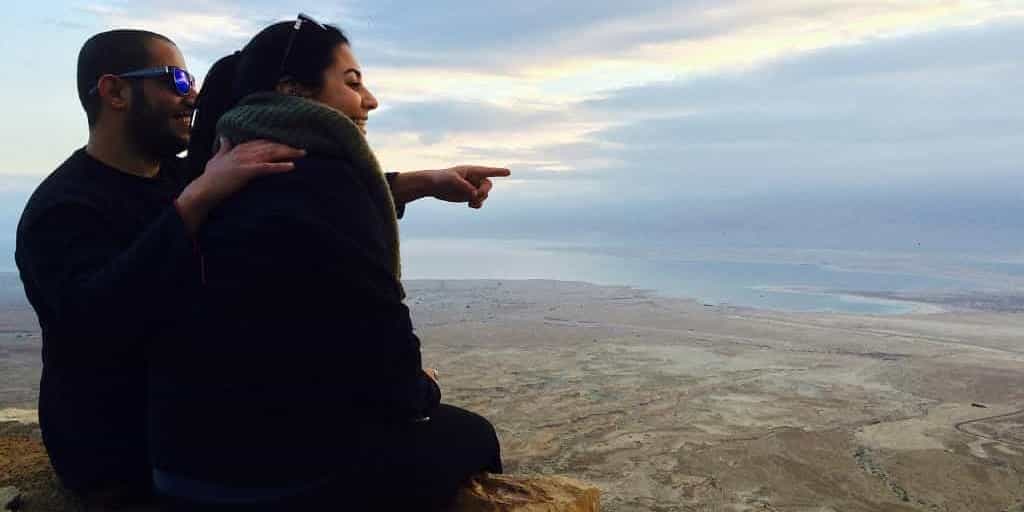The Jewish Birthright trip is a special trip to Israel that has a lot of people talking. The organization brings young Jewish adults, aged 18- 26, to Israel for ten days to explore the country and begin to truly think about how to define and fine tune their Jewish identity. Founded in 1999, Birthright- Taglit has three primary stated goals:
-
To diminish the growing division between Israeli youth and Jewish communities around the world.
-
To strengthen the sense of solidarity between Israeli youth and Jewish communities throughout the world.
-
And to promote the idea of a trip to Israel for all Diaspora Jews as a critical part of Jewish life outside of Israel.
Explore more here about Birthright’s goals. Best off all, the trip is free!
The target audience of Birthright: Why sign up at all?
Now that sounds like a pretty valid trip. As a young Jewish adult living in the United States, or Russia, or Argentina, I can go to Israel for free and begin to figure out how I begin to incorporate Judaism into my life. I mean, think about where the participants are in their lives. If they are in the 18-21 age range, they are most likely in the process of completing their college degree. It is their first time really living away from home. All of a sudden, Mom and Dad’s rules and views don’t have the same impact as before. Mom and Dad aren’t living in our dorm room keeping an eye on our every move.
So now what?
-
Do I go to Hillel on Friday nights?
-
Do I attend services?
-
Which services?
-
Do I go only for Shabbat dinner?
-
Or Do I only go for Rosh HaShanah and Yom Kippur?
-
Do I try my first cheeseburger?
These are all very real questions Jewish college students have to ask themselves.
If I’m in the 22-26 age range, I know have some more real decisions to make. Now that I’ve graduated from college, how do I want Judaism play out in my adult life? It isn’t handed to me like in my parents’ home or at Hillel? When I move into my next apartment, do I want to put a mezuzah on my door? I am now responsible for incorporating Judaism into my life on my own terms.
-
Do I want a kosher kitchen?
-
Or Do I want to keep Shabbat?
-
Do I just want to be some kind of ‘Jewish foodie’, that is, a “bagels-and lox Jew”?
These are just as important questions for Taglit.
And don’t forget this is all happening while anti-Israel and BDS sentiment on the rise. With these political movements, or in some cases quickly, on the rise on college campuses and in twenty- and thirty something neighborhoods, young Jewish adults are asking themselves why they need to support Israel at all. Why do they need to be a target of groups who are so publicly aggressive and in some cases violent? Especially if you’ve never been there, never met an Israeli, or the last time you saw Israel, you were 10.
Birthright works to provide a forum where young adults feel safe and empowered to discuss and think about these issues. And that’s not only valid, but good.

So, what really happens?
So now that we agree that the Jewish Birthright trip is a great platform and a much needed one, what really happens on Birthright? There are actually many different providers of Birthright, who bring hundreds of groups primarily during summer and winter school break. (Sometimes 22-26 age range are scheduled during fall or spring being that they aren’t attending university classes).
Each group is made up of about 40 participants, 2 staff members from the home country of the group, a medic/guard, and a tour guide (which I have had the honor of being). After a group arrives, they spend the following ten days seeing major sites, discussing what it means to be Jewish today, and, of course, ultimately having a good time in the process.
Groups usually spend about 3 or 4 days in the north of Israel, a day in the south (at Masada and a Bedouin tent), 3 or 4 days in Jerusalem, and a day or two in Tel Aviv. If it is a specialty group that focuses on a specific interest like nature, art, etc., that schedule might be adjusted a little bit. Evening programs do occur, but not every night. On one of my groups, we had an activity where we learned a little bit of Israeli history through dance. The night before going to the Yad Vashem Holocaust Memorial Museum, groups prepare emotionally for the topic.
And after 10 days the group returns home…
Hopefully with new tools and able to find a new community to help live a more Jewish life, whatever that may mean to each participant. And that is one thing I aim to share with my Birthright groups. Living a Jewish life does NOT automatically require living a religious Jewish life. It may mean living a culturally Jewish life, a socially Jewish life, a culinary Jewish life. Part of what is so beautiful about Judaism is that there is no single right way to live it. To illustrate, when we begin Shabbat services during Birthright, I read an excerpt from a book that offers a different way to have Shabbat services.
During Havdallah, I propose that Havdallah doesn’t have to be the formal prayers we usually say, but some kind of activity that separates Shabbat from the rest of the week. That can be sitting quietly in meditation, looking at the upcoming week, and setting weekly goals. It can be cleaning the apartment and doing your laundry. It can be sitting with your loved ones and having a quality conversation.
Throughout the ten days, I challenge participants to eat something different for every lunch, something with which they may not already be familiar. By doing this, they can find different Jewish foods they can bring into their diets.
The goal is that when my groups go home, they have the tools to continue thinking about these issues. Birthright isn’t about coming on a journey to Israel and finishing it when you go back home. At its best, Birthright can serve as a starting point to actively think about our Jewish lives. And that is why I offer these open- ended ideas, questions, and options.

Does it work?
Many of you may be thinking, “This is all very fine and nice, but does it really work like this? Are the goals really accomplished? Don’t these participants want to come and have a good time on a vacation that’s free?” That’s valid, and sometimes maybe even true. Sometimes a young adult does want a fun vacation during winter break from school. They don’t have the need to answer the questions Birthright seeks to answer. Sometimes participants come on the trip and don’t feel connected to Israel and Judaism. It isn’t until after they return home, and they are at an event, or engage in a conversation, see something that reminds them of the trip, and suddenly it becomes relevant.
But I would say by and large, Birthright does work. The fact of the matter is that the issues we talk about on Birthright are relevant and significant for our times. How do I live a Jewish life? How do I respond to BDS and anti- Israel sentiments as a Jew? Especially when people ask me to respond to it because I am Jewish. These are all real questions that are being asked today. I remember asking myself these questions when I was at the University of Massachusetts, and after I graduated. I had to answer them for myself, and my answers aren’t going to be relevant for everyone else. But that is what I think makes my guiding in Birthright unique and valuable. I’ve had to answer these questions. So I help guide participants through these questions.
Every generation offers different options.
To be young Jewish adult when my parents were younger was different than what it is like today. Want an example? When my mom was growing up, everything was closed on Christmas Day. There was nothing for the Jewish kids across the United States to do. What did they do to make the day pass? They played a football game outside of the school… in the snow! It became a sort of Jewish kids Super Bowl!
What happens today? Well firstly, because interfaith marriages are much more common today, many Jewish kids are visiting their Christian grandparents. They may not believe the story or in Christianity, but they go to be with family. If not, have you ever heard that Jews eat Chinese food and go to the movies on Christmas? That’s not entirely some joke. A lot of Jews do and if not because more things are open than a generation ago, there is more to do.
In short, because of both personal experience and guiding Birthright I know it works. People go home set and ready to continue to answer these questions. But also, it is important to remember that this isn’t a university course or academic trip. It is supposed to be a fun, and exciting trip, and participants are expected to have fun. So even if the participants don’t answer these questions, but they have fun, that’s a success. That’s an indicator that it works!
How to prepare for a Birthright Trip
So now that you’re convinced to come on a Jewish Birthright trip, how do you prepare for your trip? Well, if you want to really know how to prepare for a trip, check one of my previous blogs that addresses that very issue. If you need some ideas of how to pack, click here. But Birthright is a little different.
⋅First, research the different providers of Birthright. If you are interested in learning more about a Reform Jewish lifestyle, going on a Chabad provided trip isn’t helpful. If want to experience Israel from a more Orthodox perspective, don’t go on the Reform trip. Also check out the specialty trips they have. Definitely sign up for them if they interest you.
Once you are registered for your trip, join the Facebook group, and get to know the other people in the group. Begin thinking of interesting ways to incorporate Judaism into your daily life. Decide what you want to learn about. If it’s Kabbalah, for example, read up on it a little bit before coming on your trip. Think of questions for your guide and staff. When you know what you want to learn more about, what you want to incorporate more into your life, your tour guide then knows what to focus on. And it helps you participate more, thereby getting more out of the program. When you get more out of the program, other people get more out of the program and everyone is happy.

It is SUPER important to be open-minded and not judgmental.
People are going to have different opinions from you. They are going to come from different backgrounds, and different things are going to be important to them. That doesn’t mean your values, opinions, and background aren’t important. It just means that that person with a different opinion is different from you. Before you judge them for it, listen to what they have to say. It may be something you could use in your own life. If you don’t like the idea, it is something you know you don’t want.
⋅My last major tip for preparing yourself for Birthright trip, and this is for everyone from the tour guide and staff to the participants, is to HAVE FUN!! We don’t need to impress anyone. And really this idea of finding out how you want to life your life is quite exciting. So let it all go, have a good time, and learn a new thing or two. Trust me, you’ll have the trip of a lifetime.

How Israelis See it
Now if it is so important for Diaspora Jews to see Israel, it is just as important for Israeli Jews to learn from and understand Diaspora Jews. Therefore, for half of the trip, 5 days, Israelis join the group. Through these interactions both sides can learn what’s important to the other, how each incorporates Judaism in their lives, and make friends for a lifetime. Believe me, I know this works. How? I said before I didn’t participate in Birthright. But I have participated in other programs in Israel where Israelis were part of the program. Ten years later, I’m still in close contact with those very Israelis! How is that for proof?
Final Thoughts on Jewish Birthright trip
I want to offer some final thoughts on the idea of Birthright. Birthright- Taglit is now 17 years old, and it’s going strong. That says something about the program. There is a need for this trip for young Jewish adults around the world. What also has made Birthright so successful, is its ability to change. Birthright started as a program for young adults who had never been to Israel. Birthright changed their policies so that the growing number of potential participants who had already been to Israel could also come. But it’s also successful because it fulfills a need and helps people figure out how they want to incorporate something important in their lives: the roles of religion, culture, history, and tradition.
I know many people who have had successful Birthright experiences, and I also guide Birthright, so I have experienced it from sort of the other side. And what is amazing is how much a name fits the personality. In Hebrew, the Birthright program is called “Taglit,” which means discovery. And does that ever match the personality of Birthright! The goal of the program is to discover where you as an individual, who you are, what you want to accomplish, how you want to incorporate Judaism into your life. It is a discovery trip where “you get your hands dirty” with discovering the land and your history.
Why is it called Birthright in English?
Well, what is a birthright? It is your right to something because of being born into something. It is each and every participant’s birthright to come to Israel and discover their 5,000 year old Jewish roots. And it is their birthright from when Abraham came to the land and settled down, when Isaac married Rebekah here and had Jacob; when Jacob became the father of 12 sons who later became the 12 tribes of Israel. On that basis the organizations believes it is the birthright of young Jewish adults to come, visit Israel, and discover their Jewish identity.
I think this is truly profound. It is a very important goal that I believe is working. If you are interested in seeing my latest Birthright trip, check it out here. And as usual, if you have any questions or comments, comment away below!
What does the Jewish Birthright trip mean to you? Share below your ideas, your memories from your trip, questions, and more!